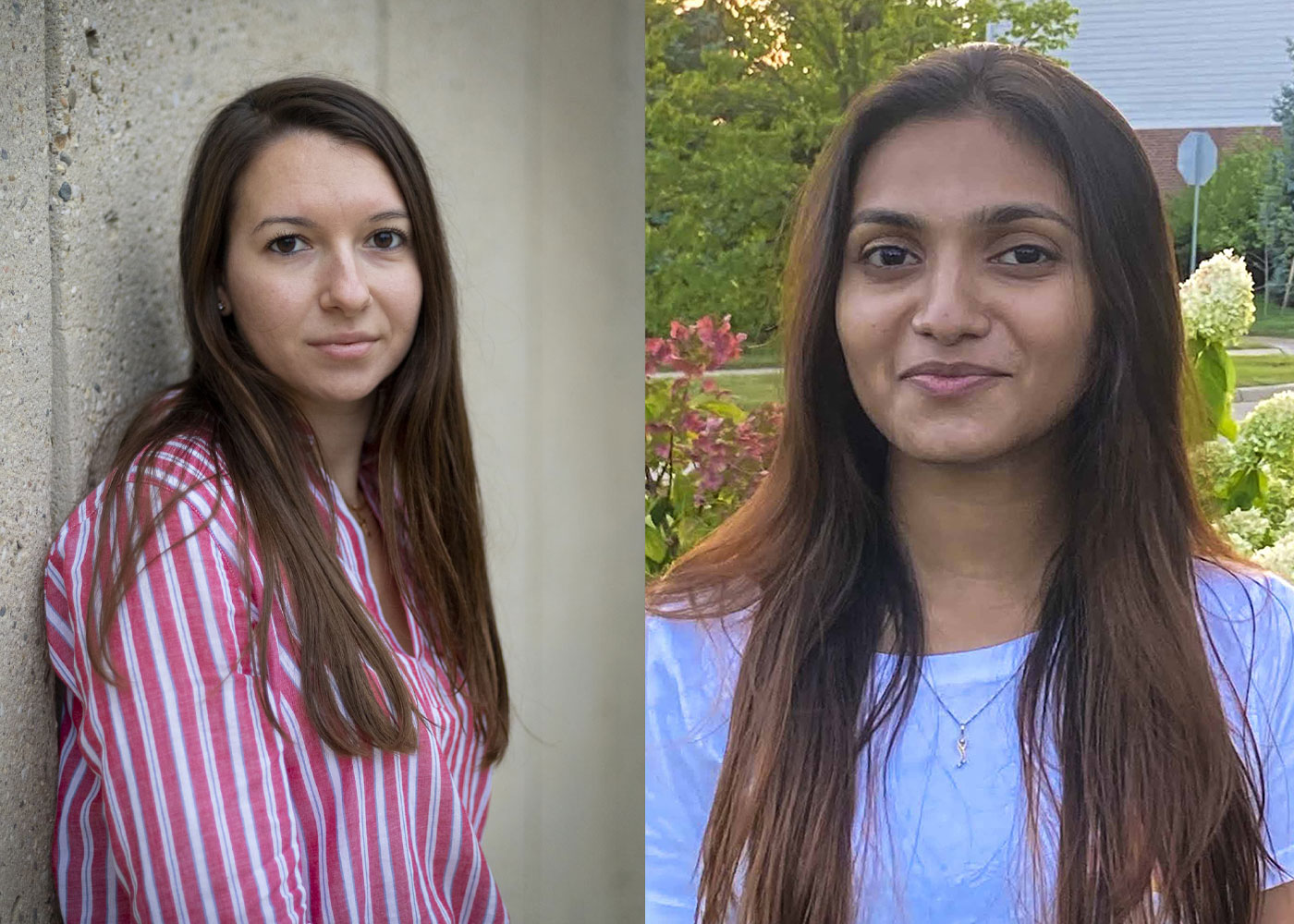
WCC students Alona Dytynenko (left) and Janani Murugesan. Photo: Shelby Beaty | The Washtenaw Voice; courtesy Janani Murugesan
Two WCC international students share their personal experiences
by JAMES CASON
Deputy Editor
Nearly 40 international students with F-1 visas currently study at WCC, according to international adviser Devin Struer. These students are from multiple countries, including Colombia, China, Korea, India, Kenya, and Ukraine. A government-issued F-1 visa allows these students to temporarily live in the U.S. while studying for a defined timeframe.
“When it comes to F-1 visa students, we have a legal obligation to make sure we’re following SEVIS guidelines put forth by the government,” said Struer. “As an institution, if we’re going to accept students from overseas, we need to be doing our best to make sure the students are doing their best to follow what they have to follow.”
F-1 students have a unique set of requirements to be eligible for U.S. college attendance: proof of sufficient financial funds to cover tuition and living expenses, English proficiency, ties to one’s home country that indicate an intent to return after completing one’s studies, extensive paperwork, and a U.S. Consulate interview for final approval.
From Ukraine to the U.S.
“The visa process is the most difficult part, and it’s a lot of work,” said Alona Dytynenko, 28, a WCC international student from Kyiv, Ukraine. “I was very nervous and anxious because, in Ukraine, it’s quite difficult to get an American visa. I had a 50/50 chance, and I’m very glad that I got it.”
Dytynenko completed her visa process in nine months and received a three-year student visa to begin her computer programming studies this fall at WCC. She holds two college degrees in Ukraine and has five years of work experience. However, she didn’t see potential growth within her previous field.
“I decided to switch my career to be a coder,” said Dytynenko. “Then, I started to think where I wanted to get this new profession.”
Dytynenko’s boyfriend from Ukraine, an engineer residing in Ann Arbor, highly recommended WCC. He came to the U.S. before Dytynenko and attended a different college prior to starting his job. After Dytynenko’s initial research, she visited the WCC last year and decided it was the best school for her future career plans. Being older, braver, and having money saved up from work, Dytynenko was ready to try something big and exciting.
At WCC, Dytynenko enjoys the opportunity to improve her English fluency. Spoken English in the U.S. sounds different from what she learned in Ukrainian schools. It is often difficult for her to understand everything she is asked: “because of the strong accent.” Dytynenko thinks everyone should try studying abroad once in their life.
“You learn so much, not only from the university but from people, from culture, from your experience, to live in another culture and to speak another language,” said Dytynenko. “It was my childhood dream to study abroad.”
A U.S. citizen from India attends WCC
Janani Murugesan, 18, was born in the U.S. but raised in Chennai, India. After graduating high school, she decided to return to the U.S. to study graphic design at WCC. She began taking online courses at WCC in 2020 from India and arrived in the U.S. for in-person classes this fall. As a U.S. Passport holder, Murugesan can study at WCC without an F-1 student visa.
“I chose Michigan because I was born here,” said Murugesan. “I chose WCC because of the financial situation. I get the same degree even if I go to EMU but for a lesser cost.”
Murugesan plans to transfer into Eastern Michigan University’s Communication Technology program after graduating from WCC. She also opted to start at the community college for a gradual transition to the university after considering the shift from India’s completely different educational system.
Murugesan was mentally prepared for her educational plan, but didn’t think about the everyday activities she would encounter after being “pampered through high school.”
“After I came here, I had to do everything for myself,” said Murugesan. Having to go to college and come back and cook and clean, I never really thought of that. I don’t think I could have planned (for it). I could only experience it after coming here.”
Murugesan’s parents are back in India, but are comforted by family friends in the U.S. who have helped her settle into a new college lifestyle thousands of miles away from home. She lives in an apartment near campus with a roommate and speaks with her parents in India every night.
“When I get homesick, I think about how I got this opportunity and how lucky I am,” said Murugesan. “I’m doing what I love. If that doesn’t help, I just call my friends and my family, and we talk for like two hours. I don’t let them sleep.”
Editor’s note: Murugesan is a graphic designer at the Voice. Typically, we would not feature a staff member in a story. However, the small pool of international students, limited amount of on-campus activity due to the pandemic, and Murugesan’s story, led us to make an exception here.


